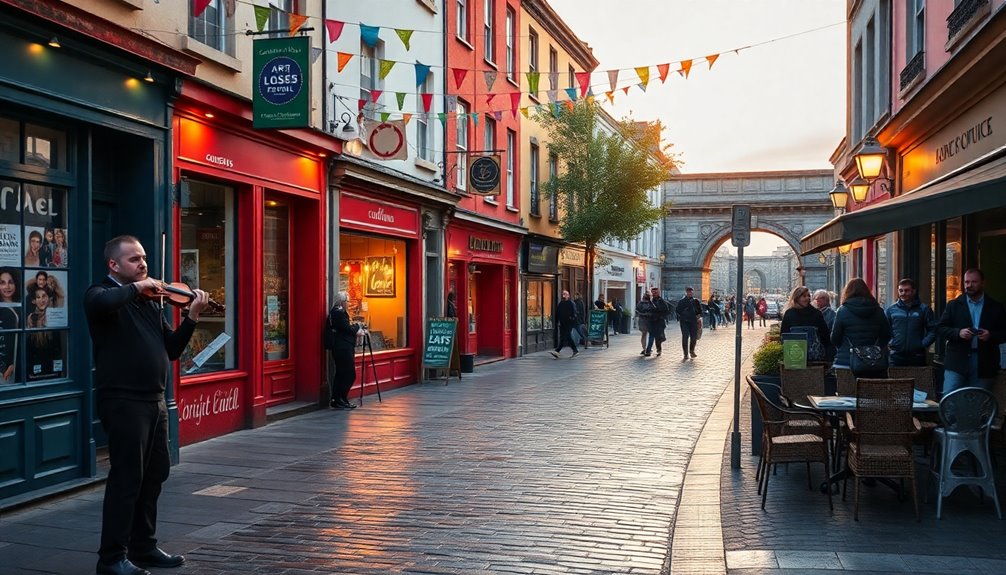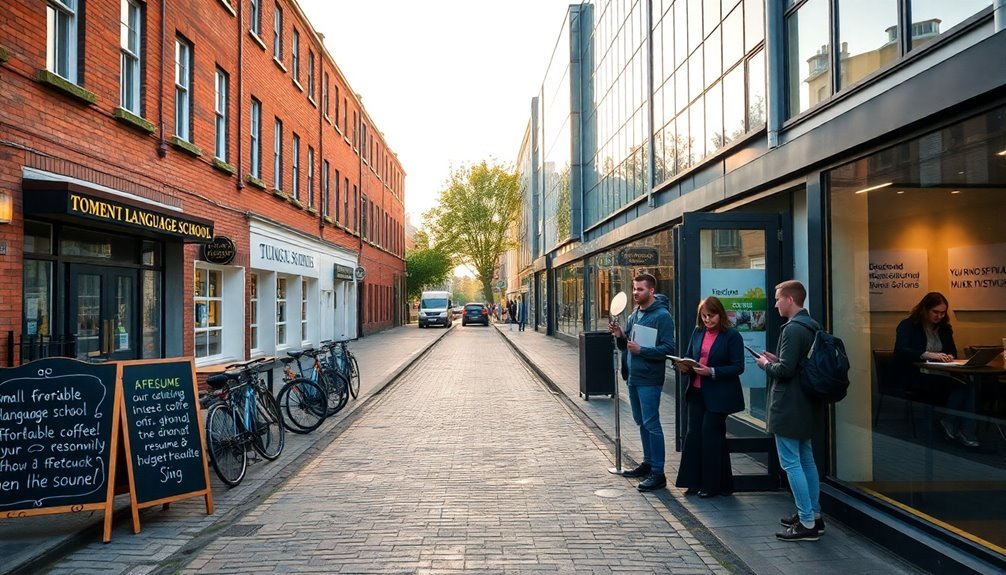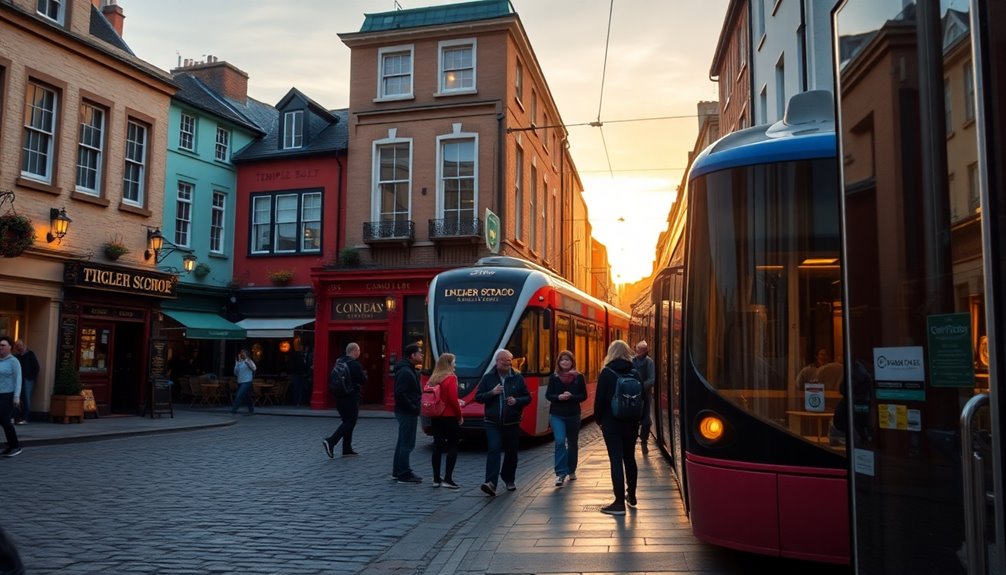
If you want fast real-world English improvement, choose Ireland for native immersion and friendly locals. Pick Dublin for top language schools, culture, and easy transport. Choose Cork for lively student life and cafes. Pick Galway for arts, festivals, and intensive courses. Consider Limerick for lower costs and practical projects, or Drogheda and Dundalk for cheaper living near Dublin. Compare regional colleges and private schools for your goals, and keep going to learn practical next steps.
Why Choose Ireland to Study English
Because Ireland blends native English use with a warm, friendly culture, you’ll improve your language skills both in class and every day on the street. You’ll find English immersion woven into daily life—cafés, markets, and pubs become practice zones where conversation feels natural, not forced. The country values independence, so you’ll choose when to study, explore, or relax without rigid schedules. Cultural diversity means you’ll meet people from many backgrounds, broadening your perspective while sharpening vocabulary and listening skills. Small cities offer relaxed living and easier integration; larger ones give more events and networking. You’ll gain confidence fast, guided by experienced teachers but shaped by real interactions. Ireland lets you learn freely, actively, and enjoyably.
Dublin: Capital City Advantages and Language Schools
In Dublin you’ll get immediate cultural immersion with museums, theatres, pubs and festivals on your doorstep. You’ll also find top-rated language schools offering varied courses and experienced teachers. Plus the city’s transport links make getting around — and exploring the rest of Ireland — quick and easy.
Central Cultural Immersion
While you explore Dublin’s streets, you’ll find the city itself becomes your classroom—museums, theaters, pubs and festivals all offer everyday chances to practice English and absorb Irish culture. You’ll wander into cultural festivals where spontaneous conversations spark, try local cuisine in bustling markets, and pick up slang from friendly bartenders. Embrace walking tours, gallery talks and open-mic nights to sharpen listening and speaking without strict schedules. Staying central means you can hop between language practice and independent adventures, balancing lessons with free afternoons for exploration. Use community events, volunteer shifts or conversation cafés to connect with locals. This immersive rhythm gives you real fluency and the freedom to learn on your terms, confidently and at your own pace.
Top Language Schools
If you’ve been soaking up language through Dublin’s streets, the next step is choosing a school that matches your goals and lifestyle. You’ll want a place that supports independent learning, mixes structured language learning with real-life practice, and fosters cultural exchange so you can grow freely. Look for schools with flexible timetables, small classes, experienced teachers, and varied extracurriculars that let you explore the city on your own terms. Consider accreditation and student support, but prioritize environments that respect your independence.
- Small-group conversation-focused courses
- Intensive exam prep with flexible scheduling
- Part-time options for explorers and remote workers
- Schools offering homestays and cultural exchange programs
Transport and Accessibility
For getting around Dublin, you’ll find a compact, well-connected city that makes attending language classes and exploring after school easy — buses, trams (Luas), trains (DART and commuter lines) and plenty of bike lanes link neighborhoods, campuses and homestays efficiently. You’ll enjoy freedom to choose: hop on a tram to the city center, catch a DART for coastal escapes, or cycle along dedicated lanes to practice independence between lessons. Language schools sit close to major stops, so public transport cuts commute time and gives flexible study schedules. Accessibility options are improving across stations and buses, with ramps, priority seating and audio announcements. Plan routes with transport apps, pick a neighborhood that suits your vibe, and move freely.
Cork: Cultural Hub and Student Life
Nestled on Ireland’s south coast, Cork mixes a lively student scene with rich cultural offerings, so you’ll find independent cafes, music venues, galleries, and historic sites within easy reach of campuses. You’ll love the freedom to explore weekend markets, join student organizations, and catch cork festivals that keep the city buzzing. Life here balances study and social adventure, so you can shape your schedule around language classes and local experiences.
- Join vibrant student organizations to meet locals and internationals
- Wander street art, galleries, and impromptu live music spots
- Sample independent cafes, markets, and casual dining options
- Enjoy flexible weekend trips to nearby coastlines and historic towns
Cork feels compact, welcoming, and ready for your next move.
Galway: Arts, Festivals, and Intensive Courses

In Galway you’ll find a lively arts and culture scene with street performers, galleries, and regular festivals that keep the city buzzing. You can pair that atmosphere with intensive English courses designed to boost your fluency quickly. If you want creative inspiration alongside focused study, Galway offers both in one compact package.
Arts and Culture Hub
Although Galway’s narrow streets and lively waterfront might first draw you in for its scenery, it’s the city’s arts scene that really defines it — a year-round pulse of music, theatre, visual arts and festivals that makes it a top spot for intensive English courses with a cultural focus. You’ll find yourself freer to learn through experience: street performances, galleries, and community projects let you practice language while soaking up cultural festivals and varied artistic expressions. The city encourages bold conversation, creative exchange, and independent exploration, so your English grows naturally as you join events, workshops, or casual nights out. Engage, question, and create — Galway’s atmosphere supports your desire for freedom in learning.
- Live music and open-mic nights
- Pop-up galleries and studio tours
- Community theatre and spoken word
- Outdoor art trails and installations
Intensive Course Options
When you’re aiming to fast-track your English, Galway’s intensive courses pair focused classroom hours with festival-driven practice so you’ll use language in real cultural settings; you’ll find programs designed for intensive learning that respect your need for flexibility and exploration. You’ll study core skills in compact modules, then test them at gigs, markets, and readings—immersive experiences that turn study time into living time. Classes are streamlined, so you can choose afternoon free time to roam cobbled streets or coastlines. Small groups and practical workshops mean feedback is direct and useful, helping you progress quickly without losing autonomy. If you want accelerated improvement while keeping freedom to roam, Galway’s intensive options fit perfectly.
Limerick: Affordability and Practical Learning

Limerick offers a wallet-friendly option for studying English without sacrificing quality: you’ll find lower living costs, affordable course fees, and plenty of budget-friendly student services that stretch your money further. You can choose affordable housing near campus, join work-placement programs, and get practical experience through community projects or internships that build confidence and real skills. You’ll move freely, balance studies and exploration, and make choices that fit your pace.
- Small schools with focused, hands-on lessons
- Local volunteering and internship chances for real-world use
- Cheap transport and student discounts to roam independently
- Flexible course lengths so you control your time
This city suits learners who want cost-effective, practical pathways to language fluency while keeping freedom central.
Waterford: Historic Setting and Small-Class Benefits
You’ll love studying in Waterford if you enjoy learning amid cobblestone streets and medieval architecture that make every walk to class feel like a history lesson. Classes are small, so you’ll get more speaking time and personal feedback from teachers. The city’s tight-knit community also offers easy opportunities to practice English with locals at markets, cafés, and cultural events.
Historic City Atmosphere
Although small, Waterford packs centuries of history into streets you can wander between classes, and that historic atmosphere makes learning English feel more immersive than it does in generic, modern campuses. You’ll explore historic landmarks and absorb the city’s cultural heritage as part of everyday life, so phrases and accents come alive around you. The cobbled lanes, restored buildings, and riverside views give you freedom to study in settings that inspire curiosity, not just conference rooms. You’ll find informal language practice in cafes, markets, and museums, letting you shape your own learning pace.
- Stroll medieval streets to spark conversation
- Visit museums for contextual vocabulary
- Join local events for real interactions
- Relax by the river to review lessons
Small Class Sizes
Because class sizes stay small in Waterford, you’ll get far more speaking practice and individual feedback than in larger programs, which helps you progress faster and with more confidence. You’ll enjoy the freedom to steer lessons toward your interests, asking questions and practicing real conversations without feeling lost in a crowd. Teachers offer personalized attention, tailoring explanations and exercises to your pace so you can take risks and improve fluency. That close-knit setup encourages quicker corrections and clearer goals, creating a steady rhythm of enhanced learning. If you value choice and autonomy, small classes let you shape your experience, focus on practical skills, and build the competence you need to use English confidently wherever you go.
Local Community Engagement
When you step into Waterford’s compact, historic streets, you’re not just studying English—you’re joining a community where small classes make it easy to connect with locals, volunteer groups, and cultural events. You’ll find classrooms that spill into the city: after lessons you can join community events, help at festivals, or volunteer with charities that welcome your English practice. Local partnerships between schools and businesses give you real-world speaking chances, while teachers tailor activities so you can explore freely and build confidence. This setting suits learners who want autonomy—choose how deeply you engage, from casual chats in cafés to structured volunteering. Here are ways to get involved and stay inspired:
- Join weekly community events and meet locals
- Volunteer with neighborhood groups
- Take part in school–business local partnerships
- Attend heritage tours and language cafés
Kilkenny: Medieval Charm and Conversation-Focused Programs
Nestled in the heart of Ireland’s southeast, Kilkenny mixes cobblestone streets, a 12th-century castle, and lively pubs with relaxed, conversation-focused English programs that help you speak naturally and confidently. You’ll wander through Kilkenny history between lessons, using real-world prompts to practice vocabulary and slang. Classes emphasize speaking, role-play, and practical listening so you can order, chat, and explore without hesitation. You’re free to shape your week: daytime workshops, evening language exchange meetups, or independent study in cozy cafés. Local tutors encourage curiosity, correcting gently while pushing you to take risks. If you want immersive conversation without overwhelming intensity, Kilkenny gives you medieval charm, supportive teachers, and friendly locals who’ll welcome your attempts at English.
Sligo: Coastal Living and Outdoor Language Immersion

From Kilkenny’s medieval streets you can head northwest to Sligo, where the coast and countryside become your classroom. You’ll find a relaxed town that fits a free-spirited study plan, letting you balance lessons with waves, hikes, and local culture. Small schools emphasize practical conversation, and informal language exchanges happen in cafes and surf shacks. You’ll learn by doing—chatting after a beach clean-up or practicing vocabulary on a mountain trail.
- Try morning surf and vocabulary drills on Rosses Point
- Join community language exchanges at cozy pubs
- Hike Benbulben while rehearsing pronunciation
- Volunteer for coastal activities and use English naturally
Sligo gives you space, movement, and real-life practice for confident speaking.
Drogheda and Dundalk: Proximity to Dublin With Lower Costs
Two towns about a half-hour train ride from Dublin, Drogheda and Dundalk give you easy access to the capital’s schools, culture, and airports without the city’s living costs. If you want freedom to explore while keeping your budget intact, the Drogheda advantages include lower rent, compact historic streets, and quick commuter links so you can study in Dublin or locally. Dundalk benefits mean vibrant student life, accessible services, and green spaces where you can recharge between classes. Both towns let you balance independent living with nearby urban opportunity — cafes, galleries, and weekend escapes are within reach. You’ll keep more control over expenses and time, choosing when to plunge into Dublin and when to enjoy quieter local life.
Regional Colleges vs. Private Language Schools
If you’re weighing regional colleges against private language schools, think about what you want from your course: regional colleges usually offer accredited academic pathways, campus life, and the chance to earn recognized qualifications, while private schools focus on intense, flexible language training and quicker placement. You’ll choose based on whether you want a structured credential and wider campus experience or the freedom to switch schedules and intensify study.
- Regional colleges often integrate with broader university resources and student activities.
- Private institutions give you modular timetables and targeted conversation practice.
- Consider class size: regional colleges may have larger cohorts, private schools usually keep groups small.
- Think about visa, accreditation, and recognition needs versus speed, flexibility, and immersive options.
Choosing the Right City Based on Budget and Lifestyle

When you’re picking a city to study English in Ireland, balance what you can afford with the lifestyle you want: Dublin and Cork offer vibrant nightlife, many work‑study opportunities, and higher rents, while smaller cities like Galway, Limerick, or Waterford give a quieter pace, lower costs, and strong local culture. Think about budget considerations realistically: rent, transport, food, and social life add up fast in big cities. If you crave freedom and variety, Dublin or Cork will energize you, but you’ll pay for that buzz. If you want slower days, artistic scenes, and easier savings, choose a smaller city. Match your lifestyle preferences to daily routines, weekend plans, and how much independence you want while studying.
Visa, Accommodation, and Work-Study Considerations
Because your visa status affects where you can live and how much you can work, it’s important to understand Ireland’s student visa rules and how they tie into accommodation options and part‑time work rights. You’ll want to check visa requirements early so you can pick a city that matches your freedom goals — whether you need flexible housing near transit or quieter, cheaper rooms. Think about how many hours you’re allowed to work, contract terms for shared flats, and whether homestays suit your independence.
- Look up visa requirements and permitted work hours before booking.
- Compare accommodation options: homestays, private flats, student halls.
- Prioritize locations with easy transport to maximize free time.
- Budget for deposits and short‑term stays while you explore.
Some Questions Answered
Can I Transfer Between Schools Mid-Course Without Losing Visa Status?
Yes — you can transfer schools mid-course, but you’ll need to check transferring schools procedures and visa implications first; you’ll want to notify immigration, keep documentation, and guarantee your new provider maintains your visa conditions so you don’t lose status.
Are There Accredited Exam-Prep Centers for IELTS or Cambridge Near Campuses?
Yes — you’ll find accredited exam-prep centers near campuses, blending rigorous exam preparation with relaxed campus vibes. You’ll sharpen language proficiency while keeping freedom to choose schedules, locations, and tutors that suit your independent goals.
What Local Healthcare Registration Is Required for International Students?
You’ll register with the local GP or student health service, explore healthcare options like public HSE or private insurance, follow the registration process at your college or local clinic, and keep documentation handy for freedom and flexibility.
Do Smaller Towns Offer Part-Time Internship Placements for Language Students?
Yes — you’ll often find smaller towns do offer internship opportunities for language students, and they’re surprisingly immersive; you’ll feel freer to practice through genuine language immersion, though placements may be fewer and more locally focused.
Are There Student Discounts for Transport, Museums, and Cultural Events?
Yes — you’ll find student discounts for public transport, museums and many cultural festivals; just carry student ID or Leap Card, check local listings, and you’ll freely explore events, exhibitions and city life at reduced prices.
